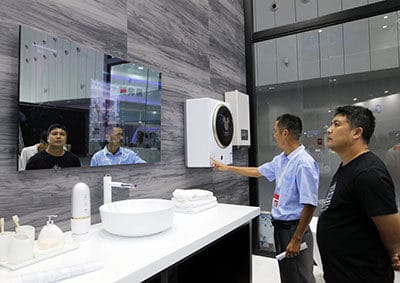
Midea chairman He Xiangjian seems encouraged by the IPO prospectus
Midea Real Estate Holdings and DaFa Properties launched their initial public offerings on Friday, with share prices for both to be fixed on 4 October testing the market at a volatile time for Chinese property developers.
Midea hopes to capitalise on “tremendous growth” in prefabricated construction on the back of strong policy support and sees “the concept of ‘Smart Home’ [becoming] a market driver for residential housing in China going forward,” according to its IPO prospectus. The company shares the same controlling shareholder as the world’s largest appliance maker, which it partners with to offer a “one stop” Smart Home solution.
Midea Aims to Buy More Land
70 percent of Midea’s net proceeds raised of between HK$2.92 billion ($372.8 million) and HK$4.23 billion are earmarked for land acquisition, including by way of M&A.
Focused on the Pearl and Yangtze River Deltas, Foshan-based Midea aims for a place among China’s top ten property developers (it ranked 39th last year by contract sales, up from 74th in 2016). It will have a HK$25.9 billion market capitalisation if its shares price at the top end of the
HK$17-21.50 marketing range, with its controlling shareholders – He Xiangjian, his daughter-in-law Lu Deyan and Midea Development – retaining an 84.75 percent stake.
Electronics Maker Plans High Tech Homes

Midea hopes to incorporate its electronics into smart homes
In addition to buying more sites, Midea says it will also commit a slice of its new cash to developing high tech products to serve what it sees as a growing need for cutting edge housing.
Known for traditionally plowing four percent of the revenues from its electronics business into developing new products, Midea’s real estate division has earmarked 15 percent and five percent of the cash from the offering for building facilities to construct prefabricated units and for research and development of smart home solutions respectively.
Midea notes that guidelines from China’s State Council aim for prefabricated construction to account for 30 percent of annual new construction on the mainland by 2025, up from 2.9 percent last year. Meanwhile, Statista forecasts that smart home technologies including lighting, heating and control of other devices via the Internet will have penetrated 21.2 percent of homes in China by 2022, up from 4.9 percent last year, according to the prospectus.
Hangzhou Developer Raises Cash for New Projects
Meanwhile, Hangzhou-based DaFa plans to use 60 percent of net proceeds of between HK$562.8 million (if shares price at the low end and the over-allotment option is not exercised) and HK$1,032.6 million (priced at the high end with full over-allotment)) to fund construction of its DaFa Bliss Oriental project in the Anhui province city of Wuhu and its Kaize Jinyuan project in Wenzhou, Zhejiang province
The Yangtze River Delta-focused developer says it will devote most of the remaining funds to repaying the majority of an RMB 530 million two-year loan which matures in September 2019 and is priced at a fixed rate of 8.5 percent.
DaFa’s weighted average effective interest rate on total borrowings was 10.2 percent compared to 5.6 percent for Midea. DaFa had RMB 5.3 billion debt at end July while Midea’s total borrowings amounted to RMB 47.4 billion.
Cornerstone Investors
Midea disclosed that it has secured cornerstone investment agreements with Youngor Group (for 60.35 million shares) and Foshan Yeshang Investment (for $30 million). Its international offering is for 162 million shares plus 18 million for the Hong Kong offering. The marketing range for the 180 million shares is HK$17-21.50 range.
DaFa has secured Everbright Xinglong Trust and Foshan Shunde Jianshi as cornerstone investors, for amounts of HK$78 million and $10 million respectively. Its international offering is for 180 million shares plus 20 million for the Hong Kong offering. The marketing range for the 200 million shares is HK$3.28-4.98.
Shanghai Project Helps Dafa Boost Revenues
DaFa witnessed a tenfold surge in revenues in the first four months of 2018, to RMB 878 million, from RMB 88 million in the year earlier period. Profit swung to RMB 78.6 million from an RMB 64.76 million loss over the same period.
It attributed the higher gross profit margin in the first four months of this year – than the previous three years – to sales of its DaFa Bliss Huating project in Shanghai, which it said accounted for 86.7 percent of total revenue and achieved a gross profit margin of 30.4 percent.
Meanwhile, Midea’s gross profit margin was 33.5 percent in the three months ending March 2018. Revenues in 1Q18 were RMB 4.8 billion, up from RMB 2.2 billion in the year earlier period.
Shares in both companies are set to start trading on Hong Kong’s stock exchange on 11 October.
BNP Paribas and CLSA are joint sponsors for Midea Real Estate’s IPO while CCB International is sole sponsor for DaFa’s.
Leave a Reply